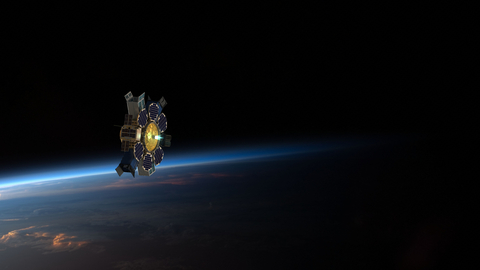On board SpaceX Transporter-2 in June, all 36 Spaceflight customer payloads were successfully deployed and Sherpa-LTE1 ignited thrusters on first attempt on orbit
During the 36th Space Symposium being held this week, Spaceflight Inc., the leading global launch services provider, announced it achieved 100% mission success for both its primary and secondary missions for SXRS-5, including the commissioning and successful firing of Astra’s Apollo Fusion electric propulsion system to enable orbital transfers. The mission, which launched on June 30 aboard SpaceX’s Transporter-2 from Cape Canaveral, Florida, featured two of the company’s innovative next-generation Sherpa orbital transfer vehicles (OTVs) -- Sherpa-LTE1 and Sherpa-FX2.
This press release features multimedia. View the full release here: https://www.businesswire.com/news/home/20210824005295/en/

Spaceflight’s electric propulsion OTV, Sherpa-LTE1, successfully ignited thrusters on its first attempt on orbit. Credit: Spaceflight Inc.
For the primary mission, the avionics systems on the two OTVs were tasked with separating 35 payloads, including six microsatellites and 29 cubesats, with a hosted payload remaining on board. Following the successful deployment of all customer spacecraft, Sherpa-LTE1 initiated the mission’s second objective, ensuring all systems were operational and in good health, as well as commissioning the propulsion system for additional orbital maneuvers. All the data collected from these experiments will provide valuable insights before Sherpa-LTC1, Spaceflight’s first chemical propulsion OTV, launches on board SpaceX’s Transporter-3 mission, targeted for no earlier than December 2021.
Spaceflight successfully completed all of its identified mission goals over the past eight weeks. Milestones accomplished include:
- Avionics sequencers (R2A) on board the two Sherpa OTVs executed commands successfully, deploying 100% of customer payloads as planned within 24 hours.
- All Sherpa subsystems were confirmed operational and healthy. System temperatures, voltages, and other data were all within the predicted limits.
- Sherpa-LTE1 detumbled and commissioned the Astra/Apollo Fusion electric propulsion system.
- Sherpa-LTE1 successfully performed thruster ignition and operation on its first attempt and is now preparing to enter its tertiary phase of the mission where it will maneuver to various orbits and conduct automated maneuvers on a weekly basis.
- Successful demonstration of modular subsystems including Sherpa’s propulsion and command-and-control operations, proving rapid prototyping by going from kickoff to flight in less than six months.
- Spaceflight’s free flyer OTV, Sherpa-FX2, successfully demonstrated payload hosting, similar to Sherpa-FX1 which launched on SpaceX’s Transporter-1 mission in January.
- Contact was made with 34 of the 36 payloads within hours of launch, with several customers communicating with their spacecraft before the deployment sequence was complete.
- All spacecraft separation data was shared with the industry’s space object tracking body, 18th Space Control Squadron, as planned within 48 hours for ongoing tracking and monitoring.
“The success of this mission has exceeded our expectations, an indication the technology we designed will be effective in executing a wide variety of missions,” said Phil Bracken, VP of engineering for Spaceflight. “With its versatility and modular architecture, Sherpa will be capable of not only deploying satellites, but hosting them on orbit, supporting infrastructure development, using various kinds of propulsion -- all at unmatched development speeds. We are excited to continue building on the success of SXRS-5 and innovating new ways to utilize Sherpa to support our customers’ missions.”
As the only company to have successfully flown three OTVs in six months, including the industry’s first electrical propulsion version, Spaceflight has plans to launch two more later this year, including its first chemical propulsion vehicle, Sherpa-LTC. Building on the success of these Sherpa missions and the company’s experience managing 41 missions to date, Spaceflight is actively planning Sherpa missions beyond low Earth orbit (LEO) to GEO and cislunar orbital insertions.
“The successes of Sherpa-LTE1, and the promise of Sherpa-LTC, demonstrate the capabilities of our groundbreaking innovations to take spacecraft to any orbit — from LEO, medium Earth orbit, geostationary orbit, lunar or beyond, in a way that has never been accomplished before,” said Grant Bonin, SVP of business development at Spaceflight. “We are committed to the overall development of space and our Sherpa program is a significant component of our vision to offer the most comprehensive launch solutions to get our customers’ payloads to space -- whenever and wherever they want.”
About Spaceflight Inc.
As the premier global launch services provider, Spaceflight is revolutionizing the business of space transportation through its comprehensive suite of launch services and Sherpa® orbital transfer vehicles. The company provides unprecedented launch flexibility to ensure customers’ smallsats get to orbit exactly when and where they want through a combination of long-standing relationships with a diverse portfolio of launch partners, innovative satellite integration capabilities, including flight and ground support hardware, licensing and logistics management, and extensive mission management expertise. Based in Seattle, Spaceflight has successfully launched hundreds of satellites and is a part of the Mitsui & Co., Ltd. portfolio, operating as an independent, U.S.-based company. For more information, visit http://www.spaceflight.com.
View source version on businesswire.com: https://www.businesswire.com/news/home/20210824005295/en/
Contacts
Christie Melby, Communiqué PR
Christine@CommuniquePR.com
206-282-4923 x127




